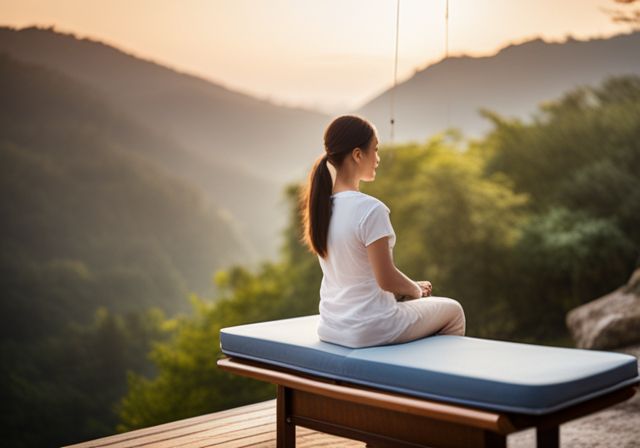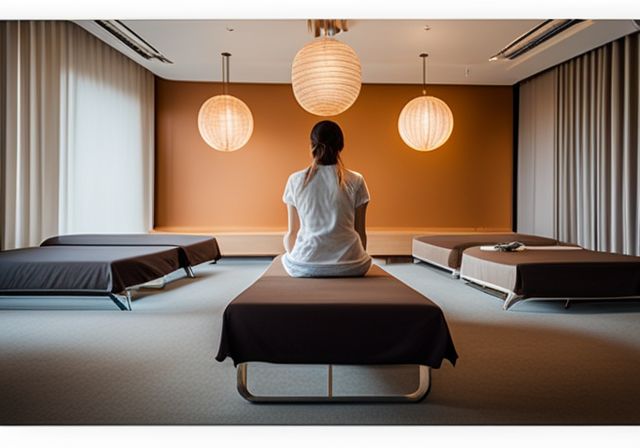Are you all too familiar with those stubborn muscle knots that seem to take up residence in your body, refusing to budge no matter what you try? If this hits close to home, it might be time to consider acupuncture as a worthwhile ally in your quest for relief.
At Family Wellness Acupuncture in Irvine, CA, Ryoko Takayama and her team are well-versed in easing these persistent muscular gripes. Now, I know the thought of needles can send a shudder down anyone’s spine—but hear me out.
Those minuscule pinpricks could very well be the ticket to embracing ease and tranquility within your muscles.
Those irksome muscle knots—tight spots that twinge and nag—are not just minor annoyances; they can really throw a wrench into our day-to-day proceedings. Whether it’s stress getting under your skin or physical exertion winding things up too tight, those troublesome lumps beneath our flesh cry out for some much-needed attention.
And that’s where acupuncture makes its grand entrance: an age-old Chinese method poised to calm the ache and loosen life’s literal tight spots.
Chances are you’ve encountered mentions of acupuncture before, but you may wonder about its effectiveness against the modern plight of muscle distress. Picture walking through life unburdened by that constant nagging pain—it’s quite an appealing notion! So stay with us as we demystify this venerable therapeutic technique and shed light on how it might just hold the answers for managing muscle pain gracefully.
Are you ready for a friendly introduction into the world of acupuncture wisdom? Let’s gently peel back the layers..
Key Takeaways
- Muscle knots form due to stress, poor posture, or injury and can cause pain if not treated.
- Acupuncture targets specific points to release muscle tension and promote healing.
- It differs from dry needling in origin, training, technique, purpose, and needle placement.
- Benefits include reducing knot – induced pain and overall emotional stress relief.
- Home remedies like acupressure mats and Chinese herbs can also help manage muscle discomfort.
Understanding Muscle Knots and Tension

Muscle knots, also known as myofascial trigger points, are areas of hyperirritability in the muscle tissue that can cause pain and discomfort. These knots form when muscles become tense and contracted due to overuse, poor posture, or injury.
Family Wellness Acupuncture, located in Irvine CA and run by Ryoko Takayama, specializes in addressing these issues through acupuncture therapy. If left untreated, muscle knots can lead to chronic pain and restricted movement.
Causes of Muscle Knots
Poor posture can lead to muscle knots. We slouch, we bend, and sometimes we sit too long without moving. This makes our muscles tense up. They form tight spots that are hard to relax.
Stress and anxiety add to the problem. Our bodies get stiff when we’re worried or scared.
Repetitive exercises or heavy lifting strain our muscles too much at times. These activities can cause tiny injuries inside our muscles. When we don’t rest enough, these small damages build up into knots.
It’s like having mini-cramps that won’t go away easily.
We also notice that sitting in one position for a long time is bad news for our muscles – especially for those of us working at desks all day! Knots seem to pop up from nowhere after hours in front of a computer screen.
Injury plays its part as well – if you twist your ankle or hurt your elbow, nearby muscles might knot up while trying to protect the injury site.
It’s clear; knots form because our muscles are under stress – whether it’s physical stress from overuse or emotional stress from daily life pressures.
The Concept of Trigger Points
Trigger points are like tiny knots in your muscles that can cause big pain. Imagine having small spots on your body that feel extra tender when you press them. These spots are a kind of muscle “ouch” area, and they’re not just any old ache – they form from muscles being tight for too long or from an injury that doesn’t heal right.
Our bodies sometimes hold onto stress in the form of these muscle knots.
We need to know about trigger points because they can cause discomfort way beyond their size. They come in two types: active and latent. Active ones make you go “ouch” as soon as you press them and might even cause pain in other parts of your body.
Latent trigger points are sneakier; you might not know they’re there until someone presses on them or they turn into active ones after some new strain or tension hits our muscles.
Both kinds mess with how we feel each day, turning simple moves into painful challenges.
Acupuncture for Muscle Knots: Does it Work?

Acupuncture has been shown to effectively release trigger points and relieve muscle knots. Family Wellness Acupuncture in Irvine CA, led by Ryoko Takayama, specializes in acupuncture for muscle tension and pain relief, offering an alternative approach to traditional treatments like massage or dry needling.
How Acupuncture Releases Trigger Points
We know you’re looking for relief from those stubborn muscle knots. Let’s dive into how acupuncture gets to the root of this pain. Our acupuncturists target specific points on your body, places where nerves and tissues meet.
These spots are trigger points where tension builds up. By inserting thin needles at these strategic locations, we send signals to your brain to “wake up” muscles that have been too tight for too long.
The moment a needle pierces your skin, something amazing starts happening under the surface. Your body begins to release powerful natural chemicals like endorphins and neuropeptides.
Think of them as tiny warriors fighting off the pain and inflammation in those knotted areas – they increase blood flow and help relax the tightened muscle fibers right at their source.
With each session, these trigger point warriors leave you feeling looser and more comfortable than before; it’s traditional Chinese medicine meeting modern-day science in action!
Acupuncture vs. Dry Needling
Acupuncture and dry needling may seem similar, but they have their own unique qualities. Let’s dive into how these treatments differ from each other:
- Origin: Acupuncture is a traditional Chinese medical treatment that has been practiced for thousands of years. Dry needling, on the other hand, is a modern technique developed for muscle pain and relies more on Western medicine principles.
- Training: To perform acupuncture, one must undergo extensive training, often spanning several years to understand the intricacies of acupuncture points and energy flow. Dry needling practitioners typically receive less than 100 hours of training focused on trigger points therapy.
- Technique: Acupuncture uses very thin needles inserted at specific acupuncture points to balance the body’s energy or Qi (pronounced “chee”). Dry needling involves inserting a needle directly into knots or areas of muscle tension without targeting the traditional acupuncture points.
- Purpose: The goal of acupuncture is holistic healing; it aims to treat various issues including pain, digestive discomforts, mental health concerns like depression and anxiety, as well as promoting overall well-being. Dry needling specifically targets muscle knots or trigger points to relieve pain and improve flexibility.
- Needle Placement: In an acupuncture session, needles stay under the skin for 20 minutes to an hour to maximize healing. With dry needling, the needle often induces a twitch response in the muscle for immediate relief which typically doesn’t involve extended needle retention.
Benefits of Acupuncture for Muscle Knots and Tension

Acupuncture provides effective relief for muscle knots, tension, and painful points in the body. It can improve referred pain in other areas too. Apart from physical benefits, acupuncture also supports mental well-being.
Sessions may lead to a sense of release in tight muscles, reduction in discomfort, and diminished emotional stress and tension.
Acupuncture has beneficial effects on muscle knots along with broader mental and physical advantages. Acupuncture doesn’t just alleviate muscle tension but also reduces emotional stress while leading to an overall improvement in well-being.
These sessions are designed not only to relieve muscle knots but also improve overall mental health and wellness through their holistic approach.
Link: Family Wellness Acupuncture
What to Expect from an Acupuncture Treatment for Muscle Knots

Transitioning from the benefits, it’s important to know what to expect from an acupuncture treatment for muscle knots. Here’s a breakdown:
- Upon arrival, you’ll have a brief consultation with the acupuncturist to discuss your concerns and medical history.
- The acupuncturist will then place thin needles at specific points on your body, which may cause a mild tingling or dull ache.
- You will relax with the needles in place for about 20 – 30 minutes, during which many people experience deep relaxation or even fall asleep.
- After the session, some individuals report feeling immediate relief, while others may notice gradual improvements over the next few days.
Home Remedies for Relieving Muscle Knots
Try using an Acupressure Mat or Chinese Herbs to help relieve muscle pain. To learn more about these effective home remedies, keep reading!
Use of an Acupressure Mat
Acupressure mats are an effective home remedy for relieving muscle knots. By applying pressure to specific points on the body, they release muscle tension and alleviate discomfort.
This cost-effective and convenient alternative to traditional acupuncture treatments can provide relief from muscle pain when used in conjunction with stretching and hot/cold therapy, making it a practical choice for those seeking at-home solutions.
Chinese Herbs for Muscle Pain
Chinese herbs are a valuable tool in relieving muscle pain and tension, often complementing acupuncture and other traditional Chinese medicine practices. When used in conjunction with acupuncture and trigger point release techniques, these herbs can aid significantly in alleviating muscle discomfort.
Their integration into treatment plans underscores their efficacy as part of holistic approaches to addressing muscle pain and tension.
The combination of Chinese herbs with other modalities such as acupuncture and trigger point release emphasizes how varied approaches can work together synergistically for maximum effectiveness in managing muscle discomfort.
Conclusion
Ready to say goodbye to muscle knots and tension? Connect with us today at (949) 836-2857 or through our website www.fwaacupuncture.com. Let’s kickstart your journey toward a healthier, more relaxed you.
Whether it’s about relief from muscle pain or just exploring the world of acupuncture, we’re here for you every step of the way!
FAQs
1. What does acupuncture do for muscle knots?
Acupuncture targets sensitive points in your skeletal muscle to ease pain—yes, even those pesky knots in your neck or back! The thin needles aim to boost blood flow and calm overactive nerve signals that make you hurt.
2. Can acupuncture help with a sports injury or workout soreness?
Absolutely! If you’ve pushed too hard at the gym and ended up with delayed onset muscle soreness (DOMS), acupuncture might just be what you need. It helps relax your muscles and can speed up recovery after an injury.
3. How does my body react to an acupuncture needle?
When an acupuncturist inserts a needle into your skin, it’s not just about poking—you’re stirring up some magic inside! Your body may release substances like calcitonin gene-related peptide (CGRP) and bradykinin which help diminish pain sensations.
4. Is acupuncture safe for treating conditions like fibromyalgia or arthritis?
Yes, it’s often used as part of the plan against these tough conditions! Acupuncture can soothe the chronic pains of fibromyalgia and arthritis by disrupting pain signals sent through the nerves.
5. Will I feel numb after getting an acupuncture treatment?
You might feel different sensations—tingles, warmth, or even a little numbness—but don’t worry; it’s all part of how acupuncture wakes up your body’s healing powers!
6. Should I choose medical acupuncture over other therapies for muscle contractions?
It depends on what feels right for you! Medical acupuncture could work wonders alongside physical therapy or massage therapy—it’s about finding that perfect combo that gets you feeling great again.
